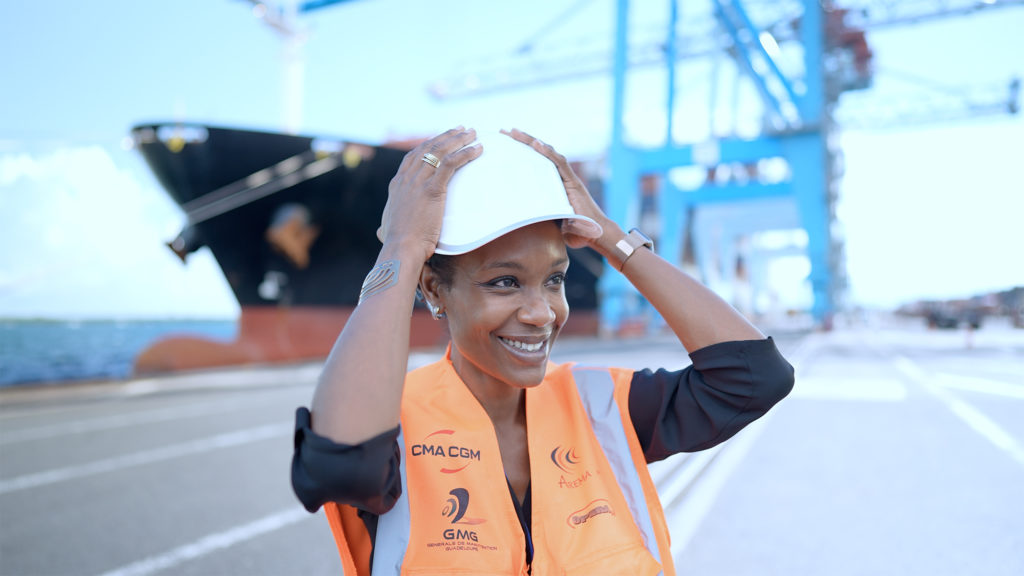 Hello, my name is Karine LOSIO. After gaining a post-graduate degree in labour law and then a Masters in human resources, I worked in HR supervisory roles in various business sectors, such as hospitality, mass retailing, consultancy, people’s services, cash-in-transit and airport security. I currently serve as Operations Manager of GIE AREMA, a subsidiary of CMA-CGM Guadeloupe, whose staff is made up mainly of dockers.
Hello, my name is Karine LOSIO. After gaining a post-graduate degree in labour law and then a Masters in human resources, I worked in HR supervisory roles in various business sectors, such as hospitality, mass retailing, consultancy, people’s services, cash-in-transit and airport security. I currently serve as Operations Manager of GIE AREMA, a subsidiary of CMA-CGM Guadeloupe, whose staff is made up mainly of dockers.
- What do you do on a day-to-day basis and what do you enjoy about being a woman in the maritime sector?
My day involves dealing with the various aspects that comprise my role.
Firstly, there is the operational aspect, for which I have to go onto the ground to get a clear understanding of the day-to-day work and the difficulties that our workers may have to contend with. I also have to make sure that health and safety regulations and processes are being followed and check that equipment is of suitable standard to uphold the safety of our teams in the port area. The maritime sector is always a potentially hazardous environment and that is why it is vital to remain vigilant and quickly carry out any corrective actions that may be required.
Secondly, managing a company necessarily entails setting and reaching targets in terms of strategy, management and customer satisfaction. So, as part of my role, I also deal with this essential aspect. Every day is about working towards each of these objectives.
The third thing is handling human resources, particularly through management and consulting with staff and their representatives. No company, no matter how powerful, can function without its human capital. Through their share of responsibility and the duties they perform, every employee plays a direct or indirect role in the success of the organisation to which they belong. Bearing this in mind, it is crucial that labour relations run smoothly and management adopts a people-focused approach, especially in the maritime sector, where working conditions are still tough.
I enjoy the fact that there are so many different aspects to my job. That said, every day is about team work. In my work I benefit from the support of skilled staff who are committed to their roles.
- What was the turning point or most significant step in your career?
The turning point undoubtedly came when I was appointed as manager, as that was a critical event in my professional development, which involved moving from a human resources management role to a senior position in operational management. From that moment on I was no longer in a support department, I became really responsible for an organisation’s technical, strategic and, of course, human success.
- How would you describe what it is like to be a woman in a mainly male environment?
I think that the increased diversity that we can see in companies, including ones in historically male-dominated industries such as maritime, reflects the way that our society is changing. For example, the fact that 7% of the dockers in our workforce are women is down both to technological advances and a change in mentalities.
As for me, my priority is to overcome the next challenge dealt to me. Being a woman does not mean the requirements of a position or sector are any different.
- What advice would you give to any woman who wants to pursue a career in the maritime sector?
My first piece of advice is: “Go for it! “. The maritime sector is exciting and women who like excitement must not put limits on their aspirations. It is up to them to ensure they show the professional skills and personal qualities they need to get to where they want to go.
As women, we often approach and solve issues differently. The second piece of advice I would give is: “Make your differences a strength not a weakness! “. Diversity, in all its forms, and adaptability make a company richer and more successful.







